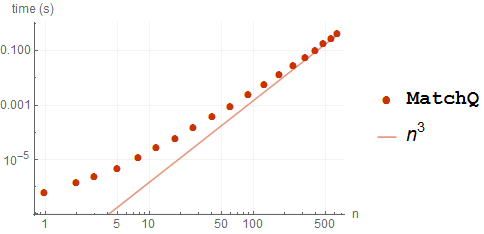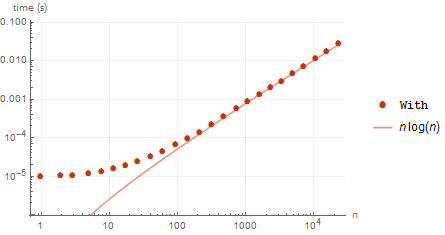Main Problem
Mr.Wizard posed this question when discussing another problem.
I reproduce the main part of Mr.Wizard's problem here:
MatchQ[{1, 2, 3, 4, 5}, {x__?((Echo[##]; False) &), y__}]
On evaluation we get the result:
1 1 1 1 False
The result is correct of course, and there should be four possible patterns, but it seems that, though MatchQ already knows the element 1 cannot pass the pattern test, it continues matching 1 three more times.
The extra matching is okay here as evaluation is fast enough, but this will consume a lot of time while matching long lists or dealing with patterns with long evaluation times, such as x__?((Echo[##]; Pause @ 1; False)&)
So the main problem is:
how to speed this process up and aviod repetitive calculation.
Some more explanation
I think some work-around is needed to get better results:
Unlike
Condition(/;),PatternTestwill check every element in a__?test-like pattern, not putting everything together. Thus this two pattern matching is different, and they give different results:MatchQ[{1, 2, 3}, {__?((Echo@{##}; True) &)}]; MatchQ[{1, 2, 3}, {x__ /; (Echo@{x}; True)}];{1} {2} {3} {1,2,3}
Thus, in most cases, there'll be no problem of interference while using PatternTest; for example, testing 1 in Sequence[1, 2] will usually be the same as testing 1 in Sequence[1, 2, 3]. While in Condition, interference will be significant.
There are a few examples of interference. Take, for example, the answer of @Leonid Shifrin under the question I've mentioned at the beginning:
Module[{flag = False}, ClearAll[test3]; test3[x_] := With[{fl = flag}, If[! flag, flag = True]; Echo @ x; fl]]; MatchQ[{-1, 2, 3, 4, 5}, {x__?test3, y__}];-1 -1 2
But I think these cases usually won't occur, so I still want to know: are there any methods available to tell Mathematica, "I know testing result of elements will be the same in each trial, SKIP the repeated testing!"?
Some Notes
I do NOT need a way to store the result of the pattern test, I'm trying to reduce the testing repetitions.
The latter one will speed up the simple pattern matching process in long lists considerably; the first one won't, as the pattern test completes in a flash, but there're are simply too many flashes, thus the overall speed is low.
Actually, the sample match I used as an example, the four tests complete in a flash, so memoizing will not speed things up. But if we can avoid the testing of the latter three
1, the whole process will be 4 times faster!
Additional and related examples
Here is an additional example that may help illustrate the inefficiency of reapplying the same test to the same element.
Replace[
{1.1, 2.2, 3, 4, 5},
{a___, x__?((Print[##]; IntegerQ[#]) &), y__} :>
{{a}, {x}, {y}}
]
1.1
1.1
1.1
1.1
2.2
2.2
2.2
3
{{1.1, 2.2}, {3}, {4, 5}}
This causes an algorithmic explosion in the time taken to process this pattern. In most applications it would be better if each element were only tested once. Observe that a test of a list of 200 elements performs almost twenty thousand tests:
i = 0;
MatchQ[N@Range[200], {a___, x__?((i++; IntegerQ[#]) &), y__}]
i
False 19900
This is not simply a matter handing the somewhat unusual case of a stateful test function (like the one with flag) as it is baked into expressly stateless patterns as well:
Needs["GeneralUtilities`"]
BenchmarkPlot[
MatchQ[#, {a___, x__Integer, y__}] &,
RandomReal[99, #] &
, "IncludeFits" -> True
]






MatchQ[{1, 2, 3, 4, 5}, {___?((Echo[#, 1]; True) &), __?((Echo[{#, # > 2}, 2]; # > 2) &), __?((Echo[#, 3]; True) &)}]:) $\endgroup$